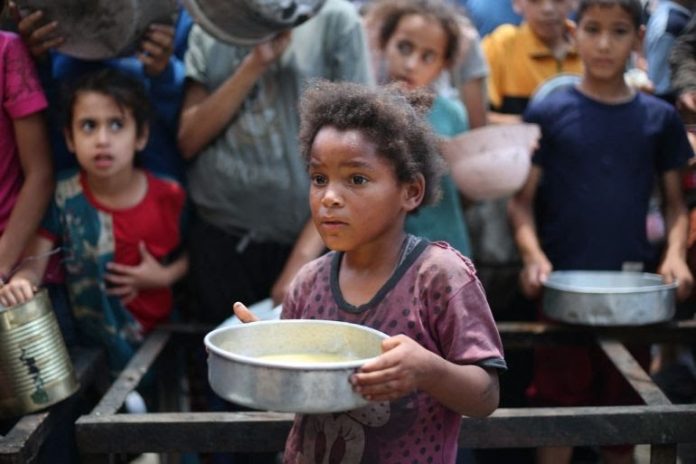Gaza City— More than 130 humanitarian organisations, including prominent names such as Oxfam, Save the Children, and Amnesty International, have jointly called for the immediate closure of the US- and Israeli-backed Gaza Humanitarian Foundation (GHF). In a strongly worded statement released on Tuesday, the NGOs accused the GHF of contributing to the deaths of starving Palestinians and described the aid mechanism as unsafe and politically motivated.
According to the joint statement, Israeli forces and armed groups have “routinely” opened fire on Palestinians attempting to access food since the GHF began operations in late May. The NGOs report that over 500 Palestinians have been killed and nearly 4,000 injured while trying to receive aid. “Palestinians in Gaza face an impossible choice: starve or risk being shot while trying to feed their families,” the statement said. “Children have been harmed in over half of the attacks on civilians at these sites, and orphaned children and caregivers are among the dead.”
The groups condemned the GHF’s operational model, which has replaced over 400 local food distribution points that operated briefly during a ceasefire with just four centralised, militarised aid sites controlled by Israeli forces. Three of these are located in Gaza’s southwest and one in the centre. This consolidation, they argue, has not only limited access to food but has also turned aid distribution into a deadly ordeal. “Amidst severe hunger and famine-like conditions, many families tell us they are now too weak to compete for food rations,” the NGOs stated. “This is not a humanitarian response.”
Speaking to Al Jazeera from Gaza City, Palestinian civil society leader Amjad Shawa criticised the GHF’s inadequate aid supplies and its geographical positioning, which he said pressures people to move toward southern Gaza. “They are delivering tiny portions of food – a few energy bars, some oil, rice, and flour – barely enough to last two or three days,” he said. “This isn’t a proper meal. It risks deepening malnutrition in Gaza.” He also argued that the location of the aid distribution points appears to serve an Israeli agenda of displacing Palestinians from northern areas.
United Nations officials and humanitarian leaders have voiced repeated concerns about the GHF. Last week, UN Secretary-General Antonio Guterres labelled the GHF aid model “inherently unsafe.” Israeli newspaper Haaretz reported that Israeli soldiers had received orders to shoot at unarmed Palestinians near aid sites to disperse them. On Tuesday, Israeli forces reportedly opened fire on hungry crowds attempting to access GHF aid in Deir el-Balah, killing at least 16 people. According to medical sources, a total of 44 Palestinians were killed across Gaza that day in Israeli attacks.
The international condemnation coincides with renewed ceasefire discussions in Washington, D.C., where Israeli Strategic Affairs Minister Ron Dermer has arrived for talks. Qatar, acting as a mediator, confirmed that negotiations are ongoing but acknowledged that progress remains limited. “The main obstacle is that both parties are not returning to the table,” said Majed al-Ansari, spokesperson for Qatar’s Foreign Ministry.
While Israeli military leaders claim their ground operations are close to achieving their objectives, Prime Minister Benjamin Netanyahu has stated that new opportunities have emerged to recover Israeli captives, 20 of whom are believed to still be alive. On the other hand, senior Hamas official Osama Hamdan said there had been no contact from Israel for weeks. “We are determined to seek a ceasefire that will save our people, and we are working with mediators to open the crossings,” he said.
As the humanitarian crisis in Gaza deepens, with extreme food shortages and constant attacks on aid seekers, international pressure is mounting to replace the GHF with a more neutral, UN-led aid distribution model that prioritises the safety and dignity of Palestinians.




